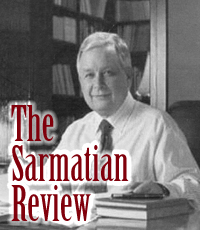| This Issue | Back Issues | Editorial Board | Contact Information |

Our Take - Sweat Equity
April 2006
Volume XXVI, No. 2
The April 2006 issue is a special issue of our journal. It features translated documents rather than scholarly articles, in line with our original mission of specializing in the translation of social, cultural, and political documents pertaining to non-Germanic countries of Central and Eastern Europe. The address to the Polish Sejm by the leader of the Law and Justice Party (PiS), which won the 2005 elections, outlines the political program of that party. The interpretation by Professor Jacek Koronacki offers reasons why Polish voters chose Lech Kaczyński for president and PiS (headed by President Kaczński's twin brother, Jarosław) for Parliament (PiS has a plurality, not a majority, in the Sejm).
There are three problems to be considered. The first is expressed by the title of the April issue: Are Kaczyński and PiS right for Poland? Jarosław Kaczyński's speech indicates that after half a century of the culturally alien Soviet occupation, countries like Poland need time to break away from the naive belief that the world is a network of conspiracies, and that exposing them equals getting rid of them. Alas, the demasked (a favorite word in many postcommunist countries) conspiracies continue to function unless there is social consensus on how to get rid of them. The second issue is the corruption that, as Kaczyński states, is endemic to the Polish economy and therefore politics. Here democracy comes to the rescue. The breaking up of corrupt networks is facilitated by periodical changes of government. The Kaczyński government has no ties to the old system, exceptions notwithstanding. But the job of getting rid of corruption is enormous. Scores of minor officials in the various ministries and institutes cannot easily be replaced. The change of staffing of the Polish diplomatic posts on the ambassadorial, consular, and lower levels is a gargantuan task. In various localities the staffers who were there under communism are still in place, or have been reshuffled from one post to another, or from a diplomatic post to a post in the offices of the government in Warsaw. Will this government be able to begin, let alone complete, the task of reviewing its representatives abroad? That too is part of the corruption ring.
Finally, there is the issue of sweat equity, or the value of trying. The concept has been used by Edward C. Prescott, 2004 Nobel Prize winner for economics. It does not appear in statistics and it cannot easily be measured. But in politics and social life, quantity does indeed become quality. Continuous efforts bring results, albeit delayed and indirect. In Polish, sweat equity translates into praca organiczna. While attempts of the Kaczyński government, and of other governments, to clean house may not be entirely successful, they will contribute to the cleansing of the public square. If the present government does not succeed in eliminating corruption entirely, the value of trying will remain. Except for the postcommunists, Polish public figures have had little practice in discharging public duties. Under communism, the principle of negative selection prevailed: the more pliable, obedient, and passive the official was, the more chances s/he had to advance in public service. People of integrity and initiative were eliminated early in the race. Now they try to rejoin the public debate. They carry the luggage of inexperience and wrong habits. Still, their efforts count, for out of imperfect debates there will eventually arise a public sphere in which the best will have a chance to compete. The texts in this issue contribute to this sweat equity. ∆
Back to the April 2006 Issue
The Sarmatian Review
sarmatia@rice.edu
Last updated 4/26/06